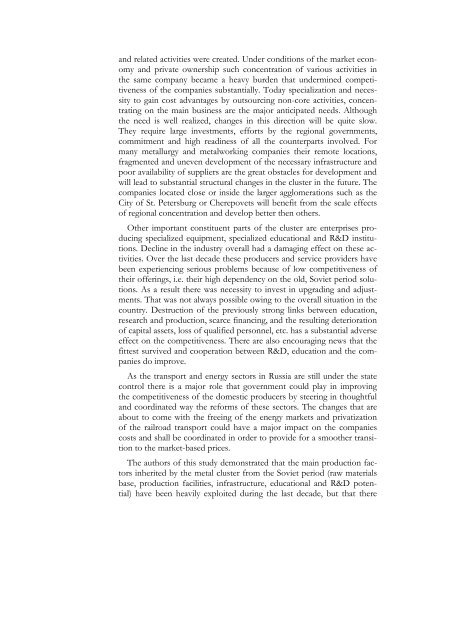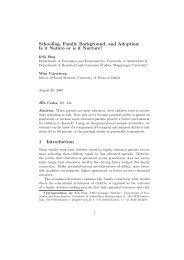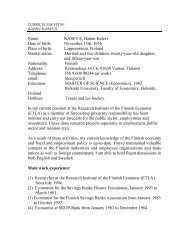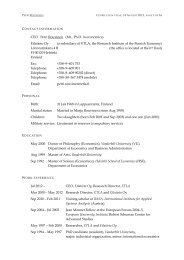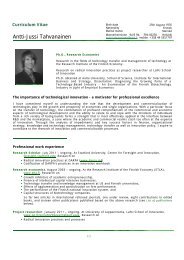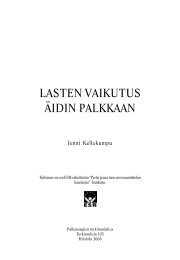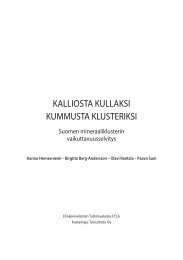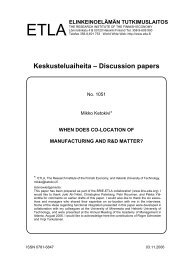Sergey Boltramovich, Grigory Dudarev, and Vladimir Gorelov ... - Etla
Sergey Boltramovich, Grigory Dudarev, and Vladimir Gorelov ... - Etla
Sergey Boltramovich, Grigory Dudarev, and Vladimir Gorelov ... - Etla
Create successful ePaper yourself
Turn your PDF publications into a flip-book with our unique Google optimized e-Paper software.
<strong>and</strong> related activities were created. Under conditions of the market economy<br />
<strong>and</strong> private ownership such concentration of various activities in<br />
the same company became a heavy burden that undermined competitiveness<br />
of the companies substantially. Today specialization <strong>and</strong> necessity<br />
to gain cost advantages by outsourcing non-core activities, concentrating<br />
on the main business are the major anticipated needs. Although<br />
the need is well realized, changes in this direction will be quite slow.<br />
They require large investments, efforts by the regional governments,<br />
commitment <strong>and</strong> high readiness of all the counterparts involved. For<br />
many metallurgy <strong>and</strong> metalworking companies their remote locations,<br />
fragmented <strong>and</strong> uneven development of the necessary infrastructure <strong>and</strong><br />
poor availability of suppliers are the great obstacles for development <strong>and</strong><br />
will lead to substantial structural changes in the cluster in the future. The<br />
companies located close or inside the larger agglomerations such as the<br />
City of St. Petersburg or Cherepovets will benefit from the scale effects<br />
of regional concentration <strong>and</strong> develop better then others.<br />
Other important constituent parts of the cluster are enterprises producing<br />
specialized equipment, specialized educational <strong>and</strong> R&D institutions.<br />
Decline in the industry overall had a damaging effect on these activities.<br />
Over the last decade these producers <strong>and</strong> service providers have<br />
been experiencing serious problems because of low competitiveness of<br />
their offerings, i.e. their high dependency on the old, Soviet period solutions.<br />
As a result there was necessity to invest in upgrading <strong>and</strong> adjustments.<br />
That was not always possible owing to the overall situation in the<br />
country. Destruction of the previously strong links between education,<br />
research <strong>and</strong> production, scarce financing, <strong>and</strong> the resulting deterioration<br />
of capital assets, loss of qualified personnel, etc. has a substantial adverse<br />
effect on the competitiveness. There are also encouraging news that the<br />
fittest survived <strong>and</strong> cooperation between R&D, education <strong>and</strong> the companies<br />
do improve.<br />
As the transport <strong>and</strong> energy sectors in Russia are still under the state<br />
control there is a major role that government could play in improving<br />
the competitiveness of the domestic producers by steering in thoughtful<br />
<strong>and</strong> coordinated way the reforms of these sectors. The changes that are<br />
about to come with the freeing of the energy markets <strong>and</strong> privatization<br />
of the railroad transport could have a major impact on the companies<br />
costs <strong>and</strong> shall be coordinated in order to provide for a smoother transition<br />
to the market-based prices.<br />
The authors of this study demonstrated that the main production factors<br />
inherited by the metal cluster from the Soviet period (raw materials<br />
base, production facilities, infrastructure, educational <strong>and</strong> R&D potential)<br />
have been heavily exploited during the last decade, but that there


